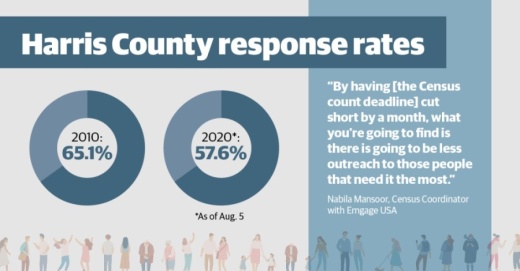Now, advocates with local civic engagement groups in Houston are warning the lost time could result in an undercount, which could shortchange the city by millions of dollars over the next decade with an especially detrimental effect for its most vulnerable communities.
"What you are seeing is something that is going to devastate our communities," said Nabila Mansoor, the census coordinator for Emgage USA who also co-chairs the Harris County/Houston Complete Count Committee. "Our plan was to work all the way until the end of October and make sure that we got to those historically undercounted populations that tend to be missed. By having it cut short by a month, what you’re going to find is there is going to be less outreach to those people that need it the most."
As of Aug. 5, the response rate in Harris County was at 57.6%, which is about 7% lower than the final response rate the last time the census was conducted in 2010. Mansoor said cities across the country are seeing the lowest response rates in recent memory, a likely side effect of the coronavirus pandemic.
Officials with the city of Houston have estimated missing 1% of the population in the count will result in the area losing $250 million over the next 10 years. For every single individual in Harris County who does not respond, Mansoor said, the county loses about $10,000 per year.
Over the course of the 2010 decade, the Houston area received about $101.6 billion in funding from federal spending programs as a result of the census count, including Title I grants, emergency response funding, and various employment and training grants, according to analysis by the Greater Houston Partnership.
While Emgage aims for a 100% response rate, Mansoor said the organization set a more realistic target of reaching 75% this year. She said that target is still their goal, but the loss of a month's worth of time will make things substantially more difficult.
After the coronavirus pandemic took hold in the U.S. in March, the U.S. Census Bureau pushed deadlines back to allow more time for employees to safely carry out counting operations, including efforts that involve going door to door to track down the county's hardest-to-reach residents. Bureau officials originally set a deadline for themselves to deliver the final count to the president and the U.S. Congress by April 30, 2021, which would have required wrapping up counting operations by Oct. 31.
Officials have since announced they will aim to deliver the data to Congress by Dec. 31, which caused the October deadline to be pushed to the end of September.
Since the announcement, governors in several states—including Michigan, California and Illinois—have publicly criticized the change and said it will impair the ability to have a fair and accurate count. As of the publication of this article, Houston Mayor Sylvester Turner and Harris County Judge Lina Hidalgo have not publicly commented on the moved deadline.
Houston in Action—a group promoting civic and cultural engagement in Houston that has worked to increase the census count locally—was among the local advocacy groups warning of an inaccurate count and citing the low response rate so far.
"These last-minute changes to the constitutionally mandated count of every person living in the U.S. threaten the accuracy of population numbers used to determine the distribution of political representation and federal funding for the next decade," officials said in an Aug. 4 Facebook post.
The effects of an undercount will be seen at the hyperlocal level, Mansoor said, because federal, state and local governments often take census data into account when determining budget allocations to certain areas. Census data is also used in the redistricting process, which determines how much political representation certain areas have based on population.
"When you erase certain communities by not counting them, what happens is they get shortchanged when it’s time to distribute that funding," Mansoor said. "And these are communities that cannot afford to miss out on that funding. They can’t afford to miss out on representation."
Mansoor said she hopes to see an effort taken up in Congress to have the deadlines reverted back to what the bureau originally laid out. In the meantime, she said groups such as Emgage will continue to make the best use of what time is left. The group is now looking for ways to compress three months' worth of public outreach events into two, she said.
"We know that we have our work cut out for us, but we certainly hope that Congress will act," Mansoor said. "Someone needs to act to make sure the census is not cut off early."
Individuals can fill out the 2020 U.S. census on behalf of their households by going to www.my2020census.gov or by calling the U.S. Census Bureau phone number at 844-330-2020.





